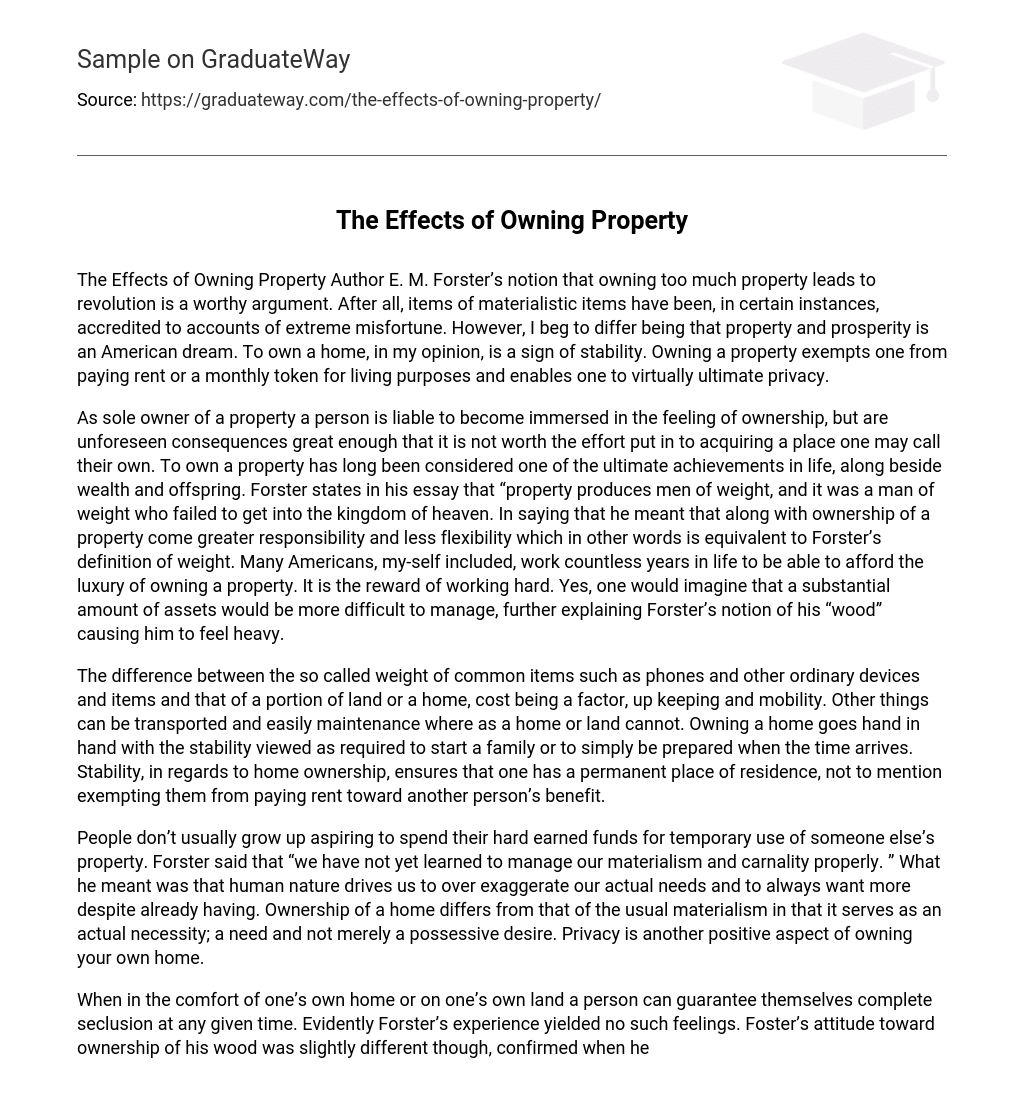Author E. M. Forster makes a valid argument that having excessive property can lead to revolution, as it is associated with extreme misfortune. However, I disagree because owning property and achieving prosperity are part of the American dream. Owning a home symbolizes stability by eliminating the need to pay rent or a monthly fee for living and providing ultimate privacy.
While owning a property can engross individuals in the sense of ownership, it is important to consider the unforeseen consequences that may outweigh the effort put into acquiring one’s own place. Traditionally, ownership of a property has been seen as a significant accomplishment in life, comparable to wealth and having children. In his essay, Forster suggests that owning property can grant individuals influence but warns that influential individuals may fail to enter the kingdom of heaven.
The passage suggests that owning property entails greater responsibility and less freedom, akin to Forster’s concept of weight. As an American, I have diligently worked for years to attain the opportunity of owning property; it is a reflection of my dedication and effort. It is reasonable to expect that managing substantial assets would pose challenges, resembling Forster’s analogy of feeling weighed down by his “wood”.
The weight difference between common items like phones and other ordinary devices, and land or a home, is due to factors such as cost, upkeeping, and mobility. While other things can be easily transported and maintained, homes and land cannot be. Owning a home is closely tied to the stability needed to start a family or be prepared for the future. Home ownership provides a permanent place to live and eliminates the need to pay rent for someone else’s benefit.
People usually don’t aspire to spend their money on temporarily using someone else’s property. According to Forster, we haven’t yet learned to properly manage our materialism and carnality. Essentially, human nature drives us to exaggerate our needs and always desire more, even when we already have enough. However, owning a home is different from regular materialism because it fulfills a genuine necessity rather than just being a possessive want. Additionally, owning a home provides privacy as a positive aspect.
Being in one’s own home or on one’s own land provides an assurance of total seclusion at any moment. However, Forster’s personal experience did not evoke such sentiments. Although Forster had a slightly different perspective on owning his wood, his discovery of a bird confirmed his sense of it being part of his property as it was on his land. Surprisingly, Forster realized that he did not have absolute control over his wood when he learned that the bird did not actually belong to him.
The author confirms that the bird flew away because it believed it belonged to itself. In my view, occasional interruptions from nature should not affect one’s sense of privacy or ownership. Being too attached to one’s possessions can have serious consequences for a property owner, but unexpected outcomes should not hinder one’s pursuit of owning property.
In his essay, E. M. Foster vividly depicts his attitude towards his “wood,” highlighting several negative outcomes of land ownership. It appears that his personal experience with owning land was unsatisfying, leading him to believe that people always desire more than what is necessary. Additionally, he expresses that his possession of the land makes him feel burdened with increased responsibilities. However, I disagree with Foster’s belief that owning property is an unpleasant experience. For certain individuals, property ownership can be a lifelong achievement associated with prosperity.
Many individuals constantly strive for success in various aspects of life. However, the author neglects to mention the additional advantage of privacy that accompanies land ownership. By possessing their own home, people can isolate themselves at any time they desire. Consequently, the impact of ownership can differ from person to person. Ultimately, it is up to each individual to determine how they opt to utilize this privilege.
Reference
- Forster, E. M. “My Wood”. Readings for Writers. Wadsworth Publishing Co. , 2010. P. 185. 12 edition, English





